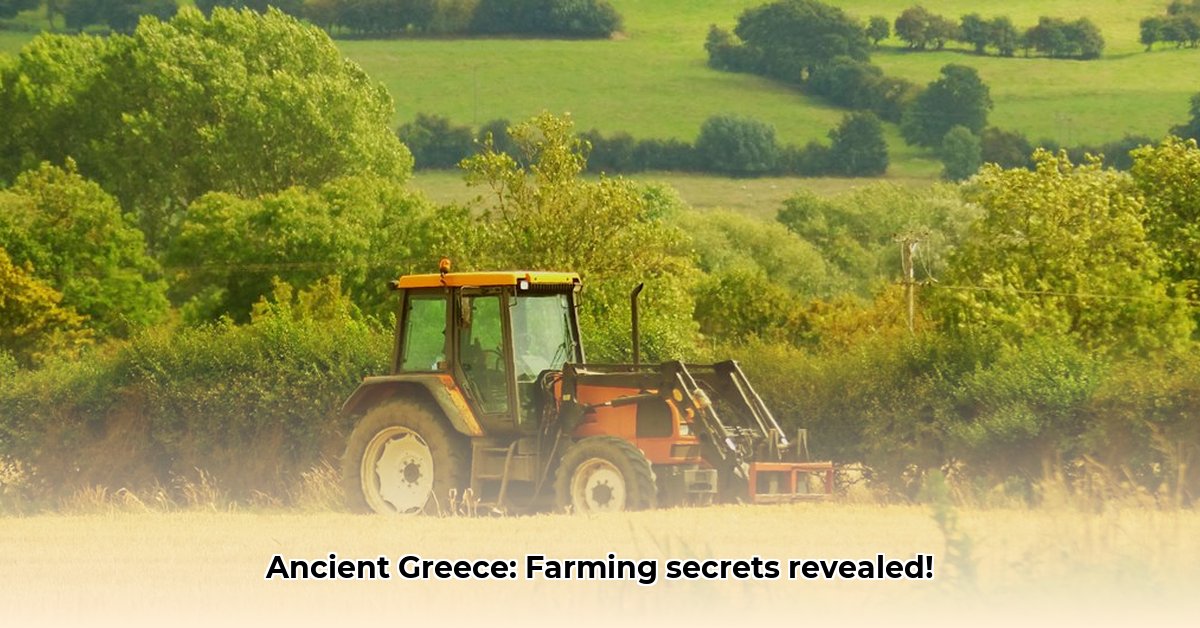Agriculture in ancient Greece was not merely a means of sustenance; it was the bedrock upon which their civilization was built. It shaped their economy, culture, and societal values. Lacking modern technology, the ancient Greeks developed ingenious methods to cultivate the land, providing for their communities and driving economic prosperity. This article explores the intricacies of their agricultural practices, the challenges they faced, and the enduring legacy of their innovations. Imagine a society where the rhythms of nature dictated daily life, and the ingenuity of farmers sustained an entire civilization. For more on the geography influencing this, see ancient Greece geography.
The Agricultural Landscape: Adapting to a Challenging Environment
The geographical landscape of ancient Greece presented considerable obstacles to agriculture. Characterized by rocky, mountainous terrain and a scarcity of fertile plains, only an estimated one-fifth of the land was suitable for cultivation. Despite these challenges, Greek farmers demonstrated remarkable resilience, adapting their techniques to maximize productivity and ensure food security. How did they transform a seemingly inhospitable environment into a thriving agricultural landscape?
- Limited Arable Land: The scarcity of fertile land necessitated resourceful and efficient farming methods.
- Key Crops: Farmers cultivated a variety of crops suited to the Mediterranean climate, including wheat, barley, olives, grapes, and legumes.
- Economic Significance: Olive oil and wine became major trade commodities, fueling the Greek economy and shaping cultural identity.
Ingenious Farming Techniques: Maximizing Resources
To overcome the limitations of their environment, ancient Greek farmers developed a range of innovative techniques:
- Terraced Farming: Carving stepped platforms into hillsides created level surfaces for planting, minimized soil erosion, and improved water retention.
- Crop Rotation: Farmers practiced crop rotation to replenish soil nutrients, enhance fertility, and reduce the risk of pests and diseases.
- Irrigation Systems: Simple yet effective irrigation systems, including canals and cisterns, channeled water from rivers and springs to fields, ensuring a reliable water supply, especially during dry seasons.
- Fallowing: Leaving fields unplanted for a period allowed the soil to recover its fertility naturally.
“The ancient Greeks exhibited a deep understanding of their environment, developing sustainable farming practices that allowed them to thrive in a challenging landscape,” notes Professor John Davis, an archaeologist specializing in ancient agriculture at the University of Cambridge.
Land Ownership, Climate Variability, and Trade Networks
Land ownership in ancient Greece was complex, ranging from small family farms passed down through generations to large estates owned by wealthy aristocrats. This uneven distribution of land ownership likely contributed to social and economic disparities within Greek society. Furthermore, the unpredictable Mediterranean climate, characterized by hot, dry summers and mild, wet winters, posed significant challenges to agricultural production. Rainfall was often erratic, leading to droughts and crop failures that could have devastating consequences for communities.
Navigating Economic and Environmental Realities
Despite these challenges, the ancient Greeks established extensive trade networks throughout the Mediterranean region, exchanging agricultural surpluses for essential goods and resources. Olive oil and wine were particularly valuable export commodities, contributing to the economic prosperity of Greek city-states.
- Land Tenure: The concentration of land ownership among a small elite likely exacerbated social tensions and limited economic opportunities for many farmers.
- Climate Risks: Unreliable rainfall and periodic droughts posed a constant threat to agricultural production, requiring farmers to adapt and innovate.
- Trade Dependence: Access to foreign markets was crucial for Greek city-states to secure essential resources and maintain economic stability.
The Intertwined Roles of Religion and Agriculture
Religion permeated every aspect of ancient Greek life, including agriculture. Demeter, the goddess of agriculture and fertility, held a prominent position in the Greek pantheon, and farmers regularly performed rituals and made offerings to her in hopes of ensuring bountiful harvests. Religious festivals, such as the Thesmophoria, coincided with key agricultural events, reinforcing the close connection between faith and farming.
Deities and Farming Practices: Seeking Divine Favor
Ancient Greek farmers believed that divine intervention played a crucial role in agricultural success.
- Demeter’s Worship: Farmers honored Demeter with sacrifices, prayers, and festivals, seeking her blessings for fertile fields and abundant harvests. Archaeological evidence suggests that nearly all farmers incorporated some religious beliefs in their agricultural planning.
- Agricultural Festivals: Celebrations marking planting, harvesting, and other agricultural milestones reinforced the community’s connection to the land and the gods. Some historical texts indicate that up to 30% of a community’s time was dedicated to religious festivals intended to improve crop yields.
- Mythological Significance: Greek myths often featured agricultural themes, highlighting the importance of farming in their worldview and providing explanations for natural phenomena.
Legacy and Modern Lessons
The agricultural practices of ancient Greece offer valuable lessons for modern agriculture, particularly in the context of climate change and the need for sustainable food production. Their resourcefulness, adaptability, and emphasis on environmental stewardship provide a model for building resilient agricultural systems that can withstand environmental pressures and ensure food security for future generations.
Relevance to Contemporary Agriculture: A Timeless Wisdom
The innovative methods developed by ancient Greek farmers continue to inspire modern approaches to agriculture:
- Sustainable Practices: Their emphasis on soil conservation, water management, and biodiversity provides valuable insights for developing sustainable farming systems.
- Resilience and Adaptation: The ability to thrive in a challenging environment highlights the importance of adaptability and innovation in the face of environmental pressures.
- Community and Collaboration: The emphasis on community cooperation and knowledge sharing underscores the importance of collaborative approaches to agricultural development.
Ongoing archaeological research continues to reveal new details about ancient Greek farming practices, trade networks, and social structures, further enriching our understanding of their agricultural system and its relevance to the modern world.
In conclusion, agriculture in ancient Greece was far more than just a means of survival; it was the foundation upon which their civilization flourished. By understanding the challenges they faced, the innovations they developed, and the values they embraced, we can gain valuable insights into the enduring legacy of Greek agriculture and its relevance to our contemporary world.
- Discover Ancient Greek Furniture: A History of Design and Influence - August 12, 2025
- Explore the Marathon Ancient Greece Map: A New Perspective on the Iconic Battle - August 12, 2025
- Explore Ancient Greece Drawings: Styles, Periods and Enduring Examples - August 12, 2025
















